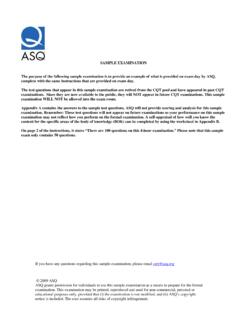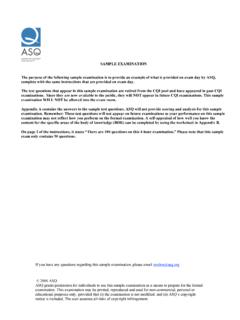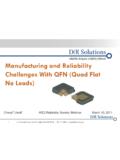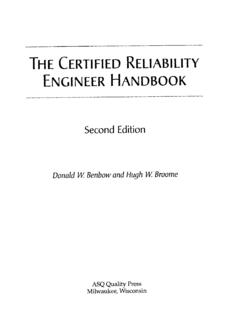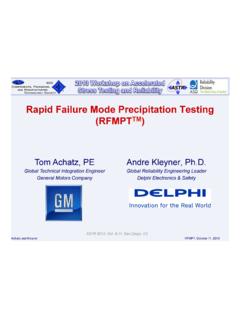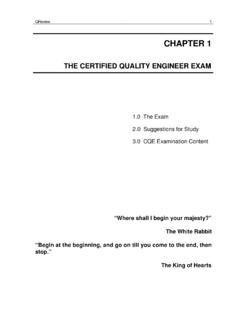Transcription of Improve your chances of passing an ASQ …
1 Test RunImprove your chances of passing an ASQcertification examby Govind RamuIn 50 Words Or Less passing a certification exam isn t a given, and the challenge isn t always in the test itself. The difference between passing and failing often occurs before the exam, so it s important to know the pitfalls before getting started. Avoid these danger zones to help ensure a successful 2008, 14,906 people took ASQ certification exams. Whether by careful preparation, exceptional test-taking skills, a bit of luck or some combination, 9,394 of these people or 63% passed. The year before, the percentage was similar: Of 14,422 people who took certification ex-ams, 9,431 passed (65%). The 2009 success rate as of October was also in that neighborhood, with 6,570 passing out of 9,928 test-takers, or 66%.For a little more perspective, Figure 1 offers a look at the pass rates for ASQ s 14 certifications .
2 To ensure certifications remain rele-vant and up to date, ASQ revises each body of knowledge (BoK) every five years. Therefore, the pass rate for each certification in Figure 1 is based on data accumulated since the BoK was last revised. So how can you avoid being one of the certification exam takers who will not pass this year?January 2010 QP41 CareersPass rate by ASQ certification / FiGuRe 10%10%20%30%40%50%Pass rateCertification60%70%80%90%100%CHACQIA CSSGB CQA CBACSSBBCCT CQPACMQ/OE CSQECQECQICQTCREA verage 65% CHA = certified hazard analysis and critical control points auditor CQIA = certified quality improvement associate CMQ/OE = certified manager of quality/ organizational excellence CQA = certified quality auditor CSSGB = certified Six Sigma Green Belt CQPA = certified quality process analyst CCT = certified calibration technician CBA = certified biomedical auditor CSSBB = certified Six Sigma Black Belt CSQE = certified software quality engineer CQE = certified quality engineer CQI = certified quality inspector CQT = certified quality technician CRE = certified reliability engineerNotes.
3 Certification pass rates since last body of knowledge change or certification inception, covering five years of data or more. Data from special administrations of exams are excluded from calculations. Certified pharmaceutical good manufacturing practices professional not presented in graph due to fewer data been on both sides of the process devel-oping and taking exams I have identified common errors and separated them into three categories: plan-ning and preparation, exam strategy and exam taking. Of course, awareness of common mistakes is just one part of the battle. It s just as important to under-stand the reasons these mistakes happen and formu-late a strategy for preventing them. If enough of us pay close attention to avoiding the following mistakes, perhaps more of us will end up on the right side of the pass/fail bar.
4 Planning and preparationBeing overconfident: Working in the quality profes-sion for a long period of time can lead some profes-sionals to assume their practical experience auto-matically gives them the knowledge they need to ace a certification exam. This overconfidence contributed to the high failure rates for ASQ certification BoKs are very broad for many certifications be-cause they are based on an extensive analysis of a wide sample of representative jobs. The chances are slim that the regular duties of any single job cover the en-tire BoK. Besides, many of us have not taken an exam since picking up our diplomas. Trying to answer the exam questions based on experience alone and within the time limit is a big challenge. Do not underestimate the amount of planning and preparation required to pass the exam, no matter how much work experience you reading the BoK thoroughly: An important first step is to read the BoK carefully before planning your preparation for the exam.
5 Highlight every key-word and tool mentioned in the BoK, and make sure you have adequate reference materials. Other than certification-specific handbooks or exam primers, it s not easy to find one book that covers every aspect of a BoK. But keep in mind the handbooks and primers are intended to offer breadth more than depth. Extended reading in many BoK subsections may be re-quired. For each certification, there are a list of referenc-es and resources for further reading on the ASQ website at Just select any certification and click on the references work experience in the BoK sections: Most certifications require experience that covers one or more BoK sections. As stated previously, one job de-scription will not cover every section of a certification BoK. Even if it did, in our day-to-day responsibilities, very few of us regularly work on every area in a BoK.
6 We use some areas much less frequently than exam questions are designed to allow test-tak-ers to show their ability to apply book knowledge to a particular situation. Specifically, those sections that are labeled with the cognitive levels of apply, analyze, evaluate and create will be easier for you to address if you can apply your learning to particular situations. Not understanding the cognitive level for each BoK section: Exam takers often ignore the cognitive level specified for each section of the BoK. Paying close attention to the cognitive levels will help you de-termine the extent of your planning and preparation. Sections that require higher cognitive levels will re-quire more in-depth instance, when you see apply, you can expect questions that contain specific examples. You should be prepared to demonstrate an understanding of when and how you would use ideas, procedures, methods, formulas, concepts and tools in the context of those examples.
7 Similarly, when you see analyze, expect questions that will require you to break down informa-tion into constituent parts, identify relationships and patterns of organization, and derive the most signifi-cant and useful information from a given situation or set of data. Being unaware of appropriate reference mate-rials: The thing that appears most frequently on the ASQ certification discussion board is a request for help in selecting and evaluating reference materials. There are many materials in the market that cover each BoK, including a long list of references specified by ASQ on its certification pages. But it is not practical (nor easy on the wallet) to purchase so many books. ASQ s certification handbooks are the best places to start. If you need additional assistance, exam-specific primers and CDs are also available from other reputable service providers.
8 But I caution against considering the handbooks or primers as your only certification refer-ences. They will not cover every aspect of the BoK in the depth that is required. As an examinee, you need to take responsibility for determining which references you need to complement your knowledge and unaware of exam practice aids: Exam prep-aration materials, such as primers and simulated exams, can help you master the art of test taking. Even for exam candidates with a vast knowledge of the subject matter January 2010 QP43and substantial work experience, primers provide con-cise coverage of material under every BoK addition, simulated exams provide real-time exam experience that will help you learn to stay fo-cused and manage your time. Particularly useful fea-tures of simulated exams are rationales for wrong an-swers and scoring by sections (performance graphs).
9 If you find specific areas in which you need additional study, find a more specialized time poorly during preparation: When budgeting your time to accommodate your strengths and weaknesses, remember the total amount of preparation time you will need depends primar-ily upon your knowledge and experience. Unless you know your own strengths and areas that need Improve -ment, you will likely spend too much time on areas for which you don t need to prepare quite as time management during preparation can Careers 1968, certified quality engineer: principles of product and service, quality evaluation and control. 1970, certified quality technician: quality prob-lems analysis, inspection sampling plans and statistical process control applications. 1972, certified reliability engineer: principles of performance evaluation for product and sys-tem safety, reliability and maintainability.
10 1984, certified quality inspector (formerly mechanical inspector): hardware documenta-tion, lab and calibration procedures, inspection, process performance, data collection and reports. 1987, certified quality auditor (CQA): stan-dards and principles of auditing, questions, evaluations and reports for quality system adequacy. 1995, certified quality manager: champions process improvement initiatives and supports strategic planning and deployment initiatives. 1996, certified software quality engineer: development of software processes, measure-ment, verification and validation, analytical methods and quality management. 1996, CQA hazard analysis and critical control point (HACCP): developed to test ap-plicant s knowledge of the HACCP standards. 2000, certified quality improvement associ-ate: designed to test basic knowledge of quality tools and their uses, as well as involvement in quality improvement projects.
